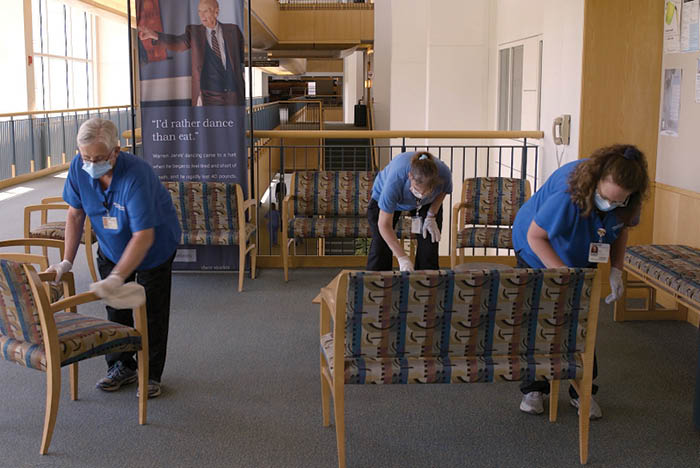EVS team adapts to fast changes

EVS technicians at Dartmouth-Hitchcock review changing cleaning best practices in daily huddles.
Image courtesy of Dartmouth-Hitchcock Medical Center
Like many hospitals waging the war against COVID-19, one of Dartmouth-Hitchcock (D-H) Medical Center’s biggest challenges has been grappling with the unknown nature of the SARS-CoV-2. Zac Conaway, environmental services (EVS) manager at the Lebanon, N.H., medical center says that his team’s strategy has been to focus on what it does know and what it can control.
“We work with our epidemiologist and infection prevention team to review the Centers for Disease Control and Prevention guidelines to determine the changes in our cleaning guidelines to protect our patients and EVS team, and support our clinical partners to be prepared for a potential surge,” Conaway says.
The EVS department held daily huddles to ensure that each member was up to date on the latest protocols. Just-in-time training also became a normal routine to adhere to evolving best practices as experts learned more about the virus and how to best eliminate it.
In order to adapt to the rapidly changing cleaning routines, Conaway says the department needed to make sure it had the resources to do so. Battling shortages for personal protective equipment (PPE) and other supplies was a major concern for the department.
“We worked closely with our vendor partners and our supply chain management division to make sure that not only do our clinicians have the lifesaving supplies and PPE necessary for patient care, but we had the PPE and cleaning supplies we needed to stay on top of this pandemic,” Conaway says. “There were some very tense times, but we never ran out of anything throughout the pandemic’s early days.”
With the fast-moving pace of the pandemic, Conaway explains that his team would never have been able to keep up if it wasn’t for its solid foundation. The EVS department routinely invests in proper training and education for its technicians.
The medical center adopted the Certified Health Care Environmental Services Technician (CHEST) program from the Association for the Health Care Environment (AHE) and currently has 60 CHEST technicians and five T-CHEST leaders, which means they are qualified to train others for CHEST. The center also invests in AHE’s Certificate of Mastery in Infection Prevention program. Fifteen of its EVS and infection prevention leaders have completed it.



